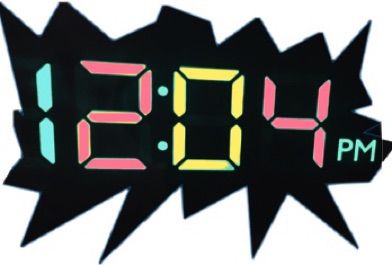Fear
Not All Times Are Alike
Your body knows time more than you think it does.
Posted November 6, 2020

“I could watch my nails grow during the hour that seemed like five, waiting for a doctor to come back to the emergency room with results of my X-ray,” said a friend who had just taken a troubling fall on black ice.
Time for hospital patients gets muddled, often wildly. It spins rapidly in overnight hospital stays where interrupted sleep confuses the body clock circadian synchronization but slows down even in a doctor's waiting room. There are peripheral impacts, where impressions of time passing depend on a host of external stimuli creating thoughts of what just happened and of what might happen next. There are contexts, practices, experiences, and biasing effects.
Recovering from any illness in a hospital often skews any sense of time toward the dreamlike impression of being on hospital time, as if it is the time passing in another universe. That kind of time prevails, even under a relatively weak medication tablet such as Tylenol. It speeds when body-temperature rises.
Think of all those brain activities working hard under the beats of time cataloging memory, planning for the future, bodily functions of breathing, blood pressure, melatonin secretion, quick motor reactions, and even blinking. Time is behind the scenes sorting through all the essentials for the body to survive. Time is there, yelling to the muscles to rapidly contract when a hand touches a hot pot. Without screaming signals to the brain, that hand is likely to burn itself into a smelly lump of flesh. That is how the mind protects the body, coordinating all the bio- and electrochemical signals that keep us alive and healthy.
That’s because your body knows time more than you think it does. You have a body clock that synchronizes cell functions according to the rhythms of the day. Plato got it right when he had his fictional character Timaeus suggest that time never has been and never will be anything other than what the sun, moon, and stars tell us it is. And that is the kind of time our bodies know when unstable protein molecules accumulate in our cells at certain hours of the night until morning comes with daylight and proteins decay to start the process all over again.
A central pacemaker in the hippocampus sitting next to the pineal gland, which produces melatonin to regulate sleep patterns, synchronizes that daily rhythm in harmony with body temperature modulation and heart rate changes loosely tied to the time of day. That is the body clock system.
Why is hospital time different than home time? Why is it not the same as work time?
Both questions have the same answer: because time flows with momentary experiences. It flows with the surroundings, happenings, involvements, encounters, and, most likely, with the anticipation of danger or the threat of danger. We get jittery with awe and fright. Time sense changes with awe because we have no control over it. It slows down considerably before and during self-selected dangerous events. Hospital time is an anxious time of uncertainty when we do not have comfortable thoughts of the future. Health issues under a doctor’s care are concerns out of our control.
Now, more than ever in recent memory, our hospital concerns have swelled into full-blown angsts. Just the thought of contracting the new coronavirus brings us further into anxieties that alter our feelings of time passing. Entering a hospital for a routine checkup, blood test, X-ray, MRI, or non-Covid related visit baits fears and renders them valid.
What will the MRI tell my doctor? Will I recover? When will I be sent home?
Those thoughts befuddle the body clock system. We could think about it this way. Back in our primordial days of living in a wilderness, when the presence of a predator would come to be within reach of one’s personal space, there would have been times when a day’s hunt expected the risk of being hunted. That’s when the hunter has a concentrated awareness when the brain defensibly fixates on a single event to anticipate just how to respond to alternative moves. The experienced hunter would know enough to weigh his risks by recollecting earlier dangers.
Run? It will come after me. Will I be able to outrun it? Maybe not. Grunt? Can I make it believe that I am stronger? Should I show my teeth? Those thoughts, in rapid succession, set the clock back to the beginning of each mental scenario for more time to modify strategy. From becoming aware of the threat to the time of deciding what to do, time slowed to let fear build in the benefit of survival. That fear, still with us for other grounds, creates an adrenal hormone torrent of activity to prepare. The pupils enlarge. The blood circulates faster. Body temperature rises. In the short meantime, the mind deliberates with itself on the question of whether to fight or take flight.
In that extraordinarily short time interval, the body’s internal clock is speeded up to accelerate heart and lung action, slow digestion, and release all the necessary sources of metabolic energy to prepare the muscles for a possible confrontation. Time dilates to accommodate the physiological reaction to a threat that could involve bodily damage. These days, the apprehension is not the hunt; rather, it can be anything real or imaginary, anything that might upset the expectations of health and contentment.
Hospitals are places of uncertainty where patients get insufficient information about what is happening and what is about to happen. When doctors walk out of hospital rooms, their patients (medicated or not) often are left with no accurate information about when their doctors will return with either some diagnoses, further instructions, or more testing options.
“Good news! You could be released either today or tomorrow,” the nurse says. "It all depends on what the doctor says." But today or tomorrow is a broad interval without a definite hour, and sometimes not an explicit day. Besides, you have no appointments, no commitments. Generally, you have an excuse to ignore time. So hospital time, often under higher than normal body temperature and higher general metabolic rates, moves on with either skipped or leapfrogged beats.
In the bigger picture, in the bigger world, there is the new coronavirus that is almost always on our minds with no definite time ending.
Knowing an end gives one a more measured feeling of time passing. When a period has a pre-established ending, time seems to pass slowly and then to accelerate as the end nears. But now, in these uncertain times, without knowing when life will return to the consolations of its intrepid continuation, we are lost in time. In these moments, we have no end to guide us, so time dilates, inflates, contracts, and confuses our daily routines and practices. Adding fear agitates the body clock to unwind its reliable mainsprings. The result is a dim aura of time.
There is the fear of contracting the virus, and there is also a paired fear that comes from not knowing when we will resume the routines of life. Some influential people tell us that a vaccine is just around the corner; experts say it might take more than a year to vaccinate everyone. And still, other specialists who say we do not know enough about the efficacy of any vaccine. So we find ourselves in a frightening time-mayhem, numbed by our feelings that our days are passing at creepy paces.
There is always a large clock in front of the patient’s bed. Its irrelevant second-hand moves by minuscule jumps, unnoticed. Who even looks at the minute hand? It’s the hours that are distinguished, yet they seem to leap forward without memories of what happened between the hops.
Hospital time is associated with end-of-life time. Entering a hospital for almost any reason having to do with an unknown outcome, presents to us, especially those of us who are old enough to think about the end of life, unconscious anxieties about that last bed rest. Our sense of time intimately connects to that end game, and so it tends to run haywire over circumstances regarding health.
© 2020 Joseph Mazur
References
Walter B. Cannon, Bodily Changes in Pain, Hunger, Fear and Rage: An Account of Recent Researches into the Functions of Emotional Excitement, (Eastford, Connecticut: Martino, 2016), 42.
Joseph Mazur, The Clock Mirage: Our Myth of Measured Time (New Haven: Yale University Press, 2020), 169.
Hudson Hoagland, Pacemakers in Relation to Aspects of Behavior (New York: Macmillan, 1935), 108
Hudson Hoagland, "The Physiological Control of Judgments in Duration: Evidence for a Chemical Clock," Journal of General Psychology 9 (1933): 267-87.




